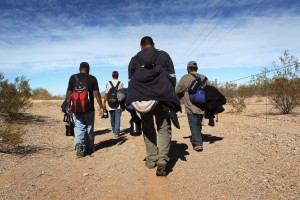The administration's order - considered by many a political tactic to woo Hispanic voters - allows eligible undocumented residents to receive what's called "deferred action," which delays deportation proceedings and offers them a green light to apply for two-year work visas (that can be renewed indefinitely).
How many are eligible?
The Obama administration said that its new policy would benefit about 800,000 undocumented immigrants. Some, however, put that figure higher: the non-partisan Pew Hispanic Center estimated the change to affect as many as 1.4 million young people, more than 10 percent of the total population of undocumented immigrants in the U.S. About 70 percent of potential beneficiaries will be Mexican, the Center predicts. And of the 1.4 million eligibly people, about 350,000 live in California, the Migration Policy Institute estimates.
What are the criteria for eligibility?
- Be 30 years old or younger
- Have come to the United States before the age of 16 and lived here continuously for at least five years
- Be currently enrolled in school; or have a high school diploma/GED; or be an honorably discharged veteran of the U.S. Coast Guard or Armed Forces
- Have no criminal record and pose no threat to national security or public safety
Does this policy offer amnesty or a path to citizenship?
Nope. And it doesn't offer the possibility of a green card either. In this respect, the new policy doesn't shake things up nearly as much as would the DREAM Act, which would offer a path to citizenship and expand educational opportunity for roughly the same group of immigrants - often labeled DREAMers. That act, though, while supported by the administration, has been has been repeatedly stalled by Congress for upwards of a decade.
In his announcement, Obama called the new plan a temporary measure put in place until he and Congress could pass long-term comprehensive immigration reform.
"Let's be clear," Obama said. "This is not amnesty. This is not immunity. This is not a path to citizenship. It's not a permanent fix. This is a temporary stopgap measure that lets us focus our resources wisely while giving a degree of relief and hope to talented, driven, patriotic young people."
Can undocumented immigrants now apply for drivers licenses and college financial aid?
The administration's policy change hasn't changed anything in this arena. For now, each state still has digression to permit or prevent undocumented residents from applying for licenses, financial aid, and even whether they can attend public universities. Currently, only New Mexico and Washington State allow undocumented immigrants to get drivers licenses. And Utah offers a driving privilege card. California does not allow undocumented residents to apply for licenses, and the state's Department of Motor Vehicles hasn't commented yet on whether it plans to make any changes to the status quo. The state, however, will implement it's own version of the Dream Act next year, allowing undocumented immigrants who fit certain criteria to apply for and receive state-funded financial aid for public universities.
Say Obama loses the election ... then what happens?
It's unclear. If Mitt Romney wins, he could technically reverse the policy, although he hasn't specified if he would do so.
How do you apply for a deferral?
Government immigration agencies are still working out the specifics. Individuals who qualify will have to submit a request for review and provide supporting evidence to the U.S. Citizenship and Immigration Services. And eligible individuals currently in the middle of deportation proceedings will soon be able to request a review.
Government Resources
